|
The week was dominated by the up to the wire negotiations between Greece and its creditors. At this writing (noon, Friday), no solutions had been reached as decision time was moved to Saturday. That however, doesn't mean that negotiations are at a standstill. This coming weekend's negotiations are looked at as a last ditch effort to reach an agreement. Analysts put the odds of an agreement at about 50-50. Investors are hesitant to predict exactly how negotiations over the weekend will pan out, but many expect an agreement to be reached, even if only for the short term.
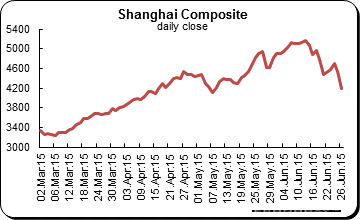 The plunge in mainland China's stock markets also caught the attention of investors. The Shanghai Composite is almost in bear territory (down 20 percent as opposed to a correction which is down 10 percent). The index sank 3.5 percent on Thursday and 7.4 percent on Friday. It lost 6.4 percent on the week after dropping 13.9 percent the week before. Elsewhere, equities were mixed as investors warily monitored the situation in Greece. The plunge in mainland China's stock markets also caught the attention of investors. The Shanghai Composite is almost in bear territory (down 20 percent as opposed to a correction which is down 10 percent). The index sank 3.5 percent on Thursday and 7.4 percent on Friday. It lost 6.4 percent on the week after dropping 13.9 percent the week before. Elsewhere, equities were mixed as investors warily monitored the situation in Greece.
Greece failed again on Thursday to clinch a deal with its international creditors, setting up a last ditch effort Saturday to avert a default next week amid fears of financial market turmoil. Eurozone finance ministers ended their third meeting in a week without agreement after the three creditor institutions (European Commission, European Central Bank and the International Monetary Fund) offered a final cash-for-reform proposal. Greek Finance Minister Yanis Varoufakis played down the latest setback after Athens submitted its own proposals, based largely on increases in tax and social contributions that the country's lenders say, however, would not raise enough revenue to plug Greece's budget hole.
German Chancellor Angela Merkel said there must be a deal on Greece before financial markets open on Monday. Her comment behind closed doors echoed the height of Eurozone debt crisis in 2012 when EU leaders feared a possible meltdown of the euro. Without a deal by the weekend to unlock frozen aid, Greece, which has received two bailouts worth €240 billion since 2010, is set to miss on a crucial repayment to the International Monetary Fund next Tuesday.
It should be noted however, that missing a payment to bond investors and to an official institution such as the IMF differs. Under the fund's policy, countries that miss payments are deemed to be in "arrears." This would put Greece in the same category as Zimbabwe, Sudan and Somalia. The three nations have combined overdue payments of about $1.8 billion.
Greek officials say the government has already compromised by offering to raise taxes and pension deductions. They say the lenders keep revising downward estimates of how much each measure proposed by Greece could raise, making it difficult to come up with an acceptable offer.
|
|
2014 |
2015 |
% Change |
|
Index |
Dec 31 |
June 19 |
June 26 |
Week |
2015 |
| Asia/Pacific |
|
|
|
|
|
|
| Australia |
All Ordinaries |
5388.6 |
5591.5 |
5536.1 |
-1.0% |
2.7% |
| Japan |
Nikkei 225 |
17450.8 |
20174.2 |
20706.2 |
2.6% |
18.7% |
| Hong Kong |
Hang Seng |
23605.0 |
26760.5 |
26663.9 |
-0.4% |
13.0% |
| S. Korea |
Kospi |
1915.6 |
2047.0 |
2090.3 |
2.1% |
9.1% |
| Singapore |
STI |
3365.2 |
3301.0 |
3320.9 |
0.6% |
-1.3% |
| China |
Shanghai Composite |
3234.7 |
4478.4 |
4192.9 |
-6.4% |
29.6% |
|
|
|
|
|
|
|
| India |
Sensex 30 |
27499.4 |
27316.2 |
27811.8 |
1.8% |
1.1% |
| Indonesia |
Jakarta Composite |
5227.0 |
4985.0 |
4923.0 |
-1.2% |
-5.8% |
| Malaysia |
KLCI |
1761.3 |
1721.8 |
1710.5 |
-0.7% |
-2.9% |
| Philippines |
PSEi |
7230.6 |
7601.2 |
7622.05 |
0.3% |
5.4% |
| Taiwan |
Taiex |
9307.3 |
9218.4 |
9462.6 |
2.6% |
1.7% |
| Thailand |
SET |
1497.7 |
1491.5 |
1518.0 |
1.8% |
1.4% |
|
|
|
|
|
|
|
| Europe |
|
|
|
|
|
|
| UK |
FTSE 100 |
6566.1 |
6710.5 |
6753.7 |
0.6% |
2.9% |
| France |
CAC |
4272.8 |
4815.4 |
5059.2 |
5.1% |
18.4% |
| Germany |
XETRA DAX |
9805.6 |
11040.1 |
11492.4 |
4.1% |
17.2% |
| Italy |
FTSE MIB |
19012.0 |
22699.4 |
23800.5 |
4.9% |
25.2% |
| Spain |
IBEX 35 |
10279.5 |
10944.3 |
11372.3 |
3.9% |
10.6% |
| Sweden |
OMX Stockholm 30 |
1464.6 |
1562.4 |
1608.3 |
2.9% |
9.8% |
| Switzerland |
SMI |
8983.4 |
8867.3 |
9007.5 |
1.6% |
0.3% |
|
|
|
|
|
|
|
| North America |
|
|
|
|
|
|
| United States |
Dow |
17823.1 |
18014.2 |
17947.0 |
-0.4% |
0.7% |
|
NASDAQ |
4736.1 |
5117.0 |
5080.5 |
-0.7% |
7.3% |
|
S&P 500 |
2058.9 |
2109.8 |
2101.6 |
-0.4% |
2.1% |
| Canada |
S&P/TSX Comp. |
14632.4 |
14653.1 |
14808.1 |
1.1% |
1.2% |
| Mexico |
Bolsa |
43145.7 |
44973.4 |
45566.3 |
1.3% |
5.6% |
 Investors here kept their cool despite the ongoing ups and downs in the Greek negotiations. The dominant sentiment seems to be that there will be a solution. Despite the uncertainty surrounding the negotiations, equities ended the week with sizable gains. The CAC jumped 5.1 percent. The DAX was not far behind, gaining 4.1 percent while the SMI added a relatively subdued 1.6 percent. The FTSE was weighed down by miners and the plunge in China's equity markets and added just 0.6 percent. Investors here kept their cool despite the ongoing ups and downs in the Greek negotiations. The dominant sentiment seems to be that there will be a solution. Despite the uncertainty surrounding the negotiations, equities ended the week with sizable gains. The CAC jumped 5.1 percent. The DAX was not far behind, gaining 4.1 percent while the SMI added a relatively subdued 1.6 percent. The FTSE was weighed down by miners and the plunge in China's equity markets and added just 0.6 percent.
With time running short, Greece and its international creditors have been holding a number of meetings in an attempt to come to a solution. However, differences remain between both sides and any deal would still need to be approved by both the Greek and German parliaments. Lingering differences were confirmed by Eurogroup President Jeroen Dijsselbloem who said on Thursday that Greece did not consent to the proposal being put to the consideration of finance ministers. Greece faces a €1.6 billion payment to the IMF on June 30 and Greek officials have suggested that the payment cannot be made without further aid. If a deal is not reached, Greece cannot honor the payment due to the lender.
Earlier in the week, equities advanced as they continued to be fueled by investor optimism that a Greek debt deal would soon be sealed. Investors were also encouraged by a strong Eurozone private sector report that indicated that the Eurozone economy was improving. But 'Grexit' worries refuse to die down as voices of dissent are heard in Athens even from within the ruling party, over more concessions being offered.
Analysts say the protracted Greece negotiations have been a distraction for investors looking to bet on a further rise in the dollar against the euro. A deal would allow markets to refocus on a likely interest rate increase from the Federal Reserve later this year, which should drive the U.S. currency even higher.
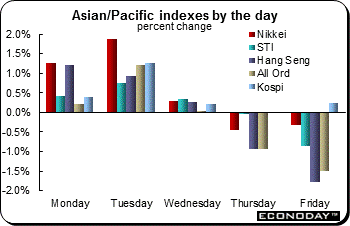 Equities were mixed while those in China tumbled. In contrast, the Nikkei closed at a new 18 year high. On Wednesday, the Nikkei closed at its highest since December 1996. Investor sentiment continued to sag as the Greek debt talks dragged on without a deal between the country and its international creditors. Equities were mixed while those in China tumbled. In contrast, the Nikkei closed at a new 18 year high. On Wednesday, the Nikkei closed at its highest since December 1996. Investor sentiment continued to sag as the Greek debt talks dragged on without a deal between the country and its international creditors.
In China, the plunge that began a week ago when the index lost 13.9 percent followed in a holiday shortened week with a 6.4 percent drop. The climax was Friday when the Shanghai Composite retreated 7.4 percent. The index is now down 18.8 percent since a multi-year closing high of 5,166.35. That leaves the index very close to entering bear market territory, defined as a decline of 20 percent from a peak. On an intra-day basis though, the Shanghai Composite has entered a bear market, with a fall of 20.06 percent from an intra-day high of 5,178.191 on June 12 to Friday's intra-day low.
During China's bull market of 2006-07, the Shanghai Composite suffered six corrections greater than 10 percent. That included a decline from mid-October to the end of November 2007 that wiped off 21.15 percent. Although the index managed to recover some poise after that, the bear market had begun and the index then sank for the next 12 months as the financial crisis took hold. Whenever Chinese stocks are falling, always remember that it could be worse. Individual stocks cannot fall more than 10 percent per session.
The Shanghai Composite Index became one of the best performing markets globally last year after years of dismal results. This year, it has been up as much as 60 percent, as local investors — cheered by a series of stimulus measures introduced by the People's Bank of China last November — borrowed a flood of cash from their brokerages to invest in the stock market. The benchmark hit its highest level since the global financial crisis on June 12. But investors have started to doubt the longevity of that stimulus driven rally and analysts are sounding louder warnings that China's market has reached unsustainable levels. A selloff over the past two weeks has taken a big bite out of earlier gains.
In Japan, the Nikkei gained 2.6 percent on the week even though it faltered Friday on mixed economic data. Japan's consumer price inflation rose marginally in May from a year earlier while the jobless rate held steady at 3.3 percent. However, household spending rose for the first time in 14 months thanks to favorable base effects, adding to expectations that the Bank of Japan will hold off expanding stimulus for now. The Nikkei is nowhere near an all-time record though. The peak now is half the size of the bubble era a quarter century ago. The Nikkei closed at a record 38,915.87 on December 29, 1989, before the bursting of the asset bubble that led to Japan's economic "lost decade".
The Sensex added 1.8 percent on the week. Good monsoon rains in many parts of the country and the government's decision to launch three flagship schemes, including the Smart City mission to spend on creating 100 smart cities across India, bolstered optimism regarding the prospects of the domestic economy. The south-west monsoon rains have been 13 percent above normal so far in June, raising hopes the Reserve Bank of Index will cut rates again in October instead of delaying it into 2016. RBI Governor Raghuram Rajan said that the progress of the monsoon thus far has been "quite strong".
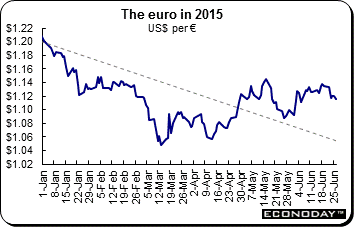 The U.S. dollar rebounded and gained against all of its major counterparts including the euro, yen, pound sterling, Swiss franc and the Canadian and Australian dollars this week. In the previous week (ending June 19), the currency retreated against all of its major counterparts after the Federal Reserve declined to indicate when the first fed funds rate increase will occur. The promise of only a 'gradual' pace of rate increases by the Fed sent the dollar lower as the foreign exchange market temporarily switched its focus from the Greece crisis. The U.S. dollar rebounded and gained against all of its major counterparts including the euro, yen, pound sterling, Swiss franc and the Canadian and Australian dollars this week. In the previous week (ending June 19), the currency retreated against all of its major counterparts after the Federal Reserve declined to indicate when the first fed funds rate increase will occur. The promise of only a 'gradual' pace of rate increases by the Fed sent the dollar lower as the foreign exchange market temporarily switched its focus from the Greece crisis.
However, this week, Greece dominated the headlines, sending the euro lower. However better than anticipated U.S. economic data have also helped bolster the value of the U.S. currency against its major counterparts. The euro had recovered after plunging to a 12-year intraday low under $1.05 in March from nearly $1.40 last August. Its decline was based on the view that the U.S. Federal Reserve was getting closer to raising interest rates which strengthened the dollar, while at the same time the European Central Bank embarked on a quantitative easing program.
|
|
2014 |
2015 |
% Change |
|
|
Dec 31 |
June 19 |
June 26 |
Week |
2015 |
| U.S. $ per currency |
|
|
|
|
|
|
| Australia |
A$ |
0.817 |
0.777 |
0.766 |
-1.4% |
-6.3% |
| New Zealand |
NZ$ |
0.780 |
0.690 |
0.684 |
-0.8% |
-12.3% |
| Canada |
C$ |
0.861 |
0.815 |
0.812 |
-0.4% |
-5.7% |
| Eurozone |
euro (€) |
1.210 |
1.134 |
1.118 |
-1.5% |
-7.6% |
| UK |
pound sterling (£) |
1.559 |
1.587 |
1.574 |
-0.8% |
1.0% |
|
|
|
|
|
|
|
| Currency per U.S. $ |
|
|
|
|
|
|
| China |
yuan |
6.206 |
6.209 |
6.209 |
0.0% |
-0.1% |
| Hong Kong |
HK$* |
7.755 |
7.752 |
7.752 |
0.0% |
0.0% |
| India |
rupee |
63.044 |
63.563 |
63.643 |
-0.1% |
-0.9% |
| Japan |
yen |
119.820 |
122.690 |
123.800 |
-0.9% |
-3.2% |
| Malaysia |
ringgit |
3.497 |
3.744 |
3.768 |
-0.7% |
-7.2% |
| Singapore |
Singapore $ |
1.325 |
1.335 |
1.349 |
-1.1% |
-1.8% |
| South Korea |
won |
1090.980 |
1107.050 |
1116.440 |
-0.8% |
-2.3% |
| Taiwan |
Taiwan $ |
31.656 |
30.784 |
30.931 |
-0.5% |
2.3% |
| Thailand |
baht |
32.880 |
33.665 |
33.795 |
-0.4% |
-2.7% |
| Switzerland |
Swiss franc |
0.9942 |
0.917 |
0.934 |
-1.8% |
6.5% |
| *Pegged to U.S. dollar |
|
|
|
|
|
|
| Source: Bloomberg |
|
|
|
|
|
|
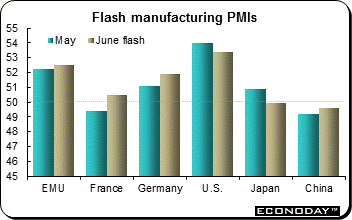 June provisional PMI results for both manufacturing and services exceeded expectations. The key composite output index weighed in at 54.1, up 0.5 points from its final May level and at a 49-month high. The improvement was thanks to a 0.6 point rise in the flash services PMI to 54.4 (also a 49-month high) and a more modest 0.3 point increase in its flash manufacturing counterpart to 52.5 (a 14-month peak). Manufacturing output (53.5 after 53.3) accelerated modestly but broad-based gains in new orders and employment still fell short of the increases seen in May. Moreover, while backlogs were up for the fourth time in five months, business expectations in services declined to a 6-month low, in large part it seems on concerns about developments in Greece. Regionally there were positive results from both core countries with the composite output index provisionally rising to 54.0 in Germany and to a 4-year high of 53.4 in France. Elsewhere in the Eurozone, economic activity decelerated for a second straight month but growth at least remained above the core. The U.S., Japan and China were added to the graph above for comparison. Both China and Japan contracted while activity in the U.S. eased. June provisional PMI results for both manufacturing and services exceeded expectations. The key composite output index weighed in at 54.1, up 0.5 points from its final May level and at a 49-month high. The improvement was thanks to a 0.6 point rise in the flash services PMI to 54.4 (also a 49-month high) and a more modest 0.3 point increase in its flash manufacturing counterpart to 52.5 (a 14-month peak). Manufacturing output (53.5 after 53.3) accelerated modestly but broad-based gains in new orders and employment still fell short of the increases seen in May. Moreover, while backlogs were up for the fourth time in five months, business expectations in services declined to a 6-month low, in large part it seems on concerns about developments in Greece. Regionally there were positive results from both core countries with the composite output index provisionally rising to 54.0 in Germany and to a 4-year high of 53.4 in France. Elsewhere in the Eurozone, economic activity decelerated for a second straight month but growth at least remained above the core. The U.S., Japan and China were added to the graph above for comparison. Both China and Japan contracted while activity in the U.S. eased.
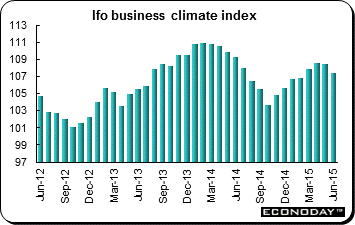 The June Ifo survey points to some deceleration in economic activity at quarter-end. At 107.4 the overall business climate index was down more than a point from its unrevised May reading and at a 4-month low. The latest decline followed a 0.1 point dip in mid-quarter but still left a second quarter average of 108.2, up from the previous period's 107.1 mean. However, June's drop reflected weaker current conditions and a decline in expectations. Among the major sectors, sentiment deteriorated in all areas except construction. In particular, manufacturing (down 2.1 points at 7.9) recorded its worst reading since January and wholesale (down 2.4 points at 7.4) its lowest level since last November. The June Ifo survey points to some deceleration in economic activity at quarter-end. At 107.4 the overall business climate index was down more than a point from its unrevised May reading and at a 4-month low. The latest decline followed a 0.1 point dip in mid-quarter but still left a second quarter average of 108.2, up from the previous period's 107.1 mean. However, June's drop reflected weaker current conditions and a decline in expectations. Among the major sectors, sentiment deteriorated in all areas except construction. In particular, manufacturing (down 2.1 points at 7.9) recorded its worst reading since January and wholesale (down 2.4 points at 7.4) its lowest level since last November.
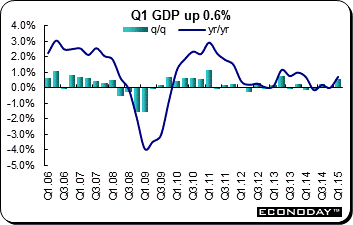 First quarter gross domestic product expanded an unrevised 0.6 percent on the quarter. However, revisions to the earlier estimate saw annual growth revised a tick higher to 0.8 percent. The main impetus behind the first quarter advance was household consumption which was up 0.9 percent from the previous quarter. Gross fixed capital formation (down 0.1 percent) was also fractionally stronger than originally thought as a 1.4 percent drop in residential investment more than offset a 0.3 percent increase in business spending. With government expenditure up 0.5 percent, final domestic demand added 0.6 percentage points to the quarterly change in total output. Net exports subtracted an unrevised 0.5 percentage points from quarterly growth, exactly offsetting a sizeable 0.5 percentage point boost from business inventories. First quarter gross domestic product expanded an unrevised 0.6 percent on the quarter. However, revisions to the earlier estimate saw annual growth revised a tick higher to 0.8 percent. The main impetus behind the first quarter advance was household consumption which was up 0.9 percent from the previous quarter. Gross fixed capital formation (down 0.1 percent) was also fractionally stronger than originally thought as a 1.4 percent drop in residential investment more than offset a 0.3 percent increase in business spending. With government expenditure up 0.5 percent, final domestic demand added 0.6 percentage points to the quarterly change in total output. Net exports subtracted an unrevised 0.5 percentage points from quarterly growth, exactly offsetting a sizeable 0.5 percentage point boost from business inventories.
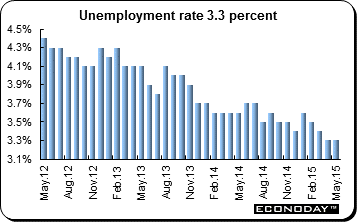 May's jobless rate held steady at an 18-year low for the second-straight month. The unemployment rate was 3.3 percent, down slightly from expectations of 3.4 percent and steady from April. This is the lowest jobless rate since April 1997. Employment increased 20,000 from a year ago after adding 40,000 jobs in April. The job-to-applicants ratio inched higher to 1.19, from 1.17 the previous month against expectations of 1.17. A tighter labour market should help workers demand higher wages and create a virtuous circle for inflation to rise. That is what the BoJ is hoping for. May's jobless rate held steady at an 18-year low for the second-straight month. The unemployment rate was 3.3 percent, down slightly from expectations of 3.4 percent and steady from April. This is the lowest jobless rate since April 1997. Employment increased 20,000 from a year ago after adding 40,000 jobs in April. The job-to-applicants ratio inched higher to 1.19, from 1.17 the previous month against expectations of 1.17. A tighter labour market should help workers demand higher wages and create a virtuous circle for inflation to rise. That is what the BoJ is hoping for.
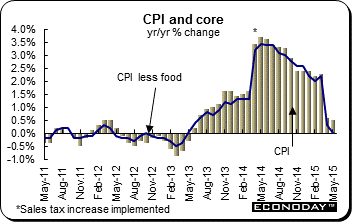 May consumer prices were up 0.3 percent on the month and 0.5 percent from a year ago. Excluding fresh food, the CPI inched up 0.2 percent and added 0.1 percent on the year. The June preliminary readings from Tokyo indicated that the overall CPI declined 0.4 percent on the month and was up 0.3 percent on the year. The Tokyo data are seen as a precursor to the national index. Excluding fresh food, the Tokyo index inched down 0.1 percent on the month and edged up 0.1 percent on the year. Among the components of the national index, energy costs dropped 6.0 percent on the year after sliding 3.4 percent in April. TVs inched down 0.1 percent after dropping 3.4 percent. Electronics goods prices also dropped less in May – down 1.7 percent after 3.5 percent. May consumer prices were up 0.3 percent on the month and 0.5 percent from a year ago. Excluding fresh food, the CPI inched up 0.2 percent and added 0.1 percent on the year. The June preliminary readings from Tokyo indicated that the overall CPI declined 0.4 percent on the month and was up 0.3 percent on the year. The Tokyo data are seen as a precursor to the national index. Excluding fresh food, the Tokyo index inched down 0.1 percent on the month and edged up 0.1 percent on the year. Among the components of the national index, energy costs dropped 6.0 percent on the year after sliding 3.4 percent in April. TVs inched down 0.1 percent after dropping 3.4 percent. Electronics goods prices also dropped less in May – down 1.7 percent after 3.5 percent.
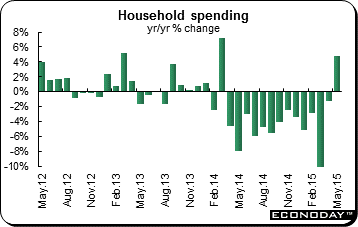 Household expenditures finally increased after dropping for 14 consecutive months. Spending was up a healthy 4.8 percent on the year. All subcategories gained with the exception of culture & recreation which declined 1.9 percent. Three subcategories scored gains in the double digits. Housing soared 23.6 percent while furniture & household utensils jumped 19.3 percent. Transportation & communication gained 14.8 percent. This is the first positive reading since March last year, the month before the government increased the national sales tax for the first time in almost two decades, which hit consumer spending hard and put a dent in economic growth. Household expenditures finally increased after dropping for 14 consecutive months. Spending was up a healthy 4.8 percent on the year. All subcategories gained with the exception of culture & recreation which declined 1.9 percent. Three subcategories scored gains in the double digits. Housing soared 23.6 percent while furniture & household utensils jumped 19.3 percent. Transportation & communication gained 14.8 percent. This is the first positive reading since March last year, the month before the government increased the national sales tax for the first time in almost two decades, which hit consumer spending hard and put a dent in economic growth.
Investors focused on the ongoing saga surrounding Greece and its seemingly endless negotiations with the EC, ECB and IMF as yet another deadline approached. The situation there at least temporarily took priority over when the Federal Reserve would increase its fed funds rate. The plunge in mainland China's stock market seemed to have limited effect on global markets.
The second quarter ends Tuesday in a data heavy week. The June 30 deadline when Greece is supposed to make a payment to the IMF looms. Key June manufacturing data in the form of the purchasing managers indexes will be posted. Unemployment data for the Eurozone and Germany will be closely monitored. Investors will be looking closely at Japan's second quarter Tankan Survey which is regarded as a key element in Bank of Japan policy making. And the employment situation report will be released on Thursday rather than Friday which is a holiday in the U.S.
| Central Bank activities |
|
| July 2 |
Eurozone |
European Central Bank Minutes Published of June 3 Meeting |
| |
|
|
| The following indicators will be released this week... |
| Europe |
|
|
| June 29 |
Eurozone |
EC Business and Consumer Survey (June) |
|
Germany |
Retail Sales (May) |
| June 30 |
Eurozone |
Harmonized Index of Consumer Prices (June flash) |
|
|
Unemployment Rate (May) |
|
Germany |
Unemployment Rate (June) |
|
France |
Consumption of Manufactured Goods (May) |
|
|
Producer Price Index (May) |
|
UK |
Gross Domestic Product (Q1.2015 final estimate) |
| July 1 |
Eurozone |
Manufacturing PMI (June) |
|
Germany |
Manufacturing PMI (June) |
|
France |
Manufacturing PMI (June) |
| July 2 |
Eurozone |
Producer Price Index (May) |
| July 3 |
Eurozone |
Composite PMI (June) |
|
|
Retail Sales (May) |
|
Germany |
Composite PMI (June) |
|
France |
Composite PMI (June) |
| |
|
|
| Asia/Pacific |
|
|
| June 29 |
Japan |
Industrial Production (May) |
|
|
Retail Sales (May) |
| July 1 |
Japan |
Bank of Japan Tankan (Q2.2015) |
|
|
Manufacturing PMI (June) |
|
China |
Manufacturing PMI (June) |
|
India |
Manufacturing PMI (June) |
| July 2 |
Australia |
Merchandise Trade (May) |
| July 3 |
Australia |
Retail Sales (May) |
|
Japan |
Composite PMI (June) |
|
China |
Composite PMI (June) |
| |
|
|
| Americas |
|
|
| June 29 |
Canada |
Industrial Product Price Index (May) |
| June 30 |
Canada |
Monthly Gross Domestic Product (April) |
Anne D Picker is the author of International Economic Indicators and Central Banks.
|

